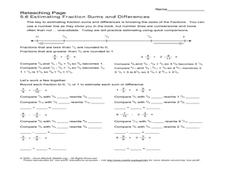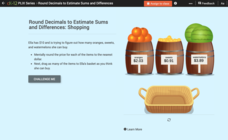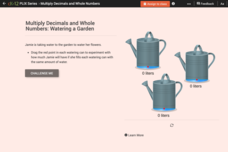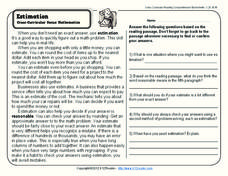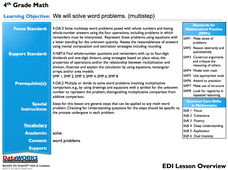Curated OER
Estimating Sums and Differences
Work on rounding, estimating, adding, and subtracting with a helpful math worksheet! Fifth graders study different sets of addition and subtraction problems, and after rounding each number to the leading digit, they estimate what the sum...
Curated OER
Estimating Differences of Money
When it comes to money math, show scholars that estimation is their best friend. They round money values to the closest dollar, 10 dollar, and 100 dollar increments, solving 19 addition and subtraction problems with approximate answers....
Curated OER
Estimating Fractions and Sums
What is a quick comparison, and how can it help you estimate sums and differences? For this estimation worksheet, learners estimate fractions in addition problems. They complete four problems where they estimate the sums after reviewing...
Curated OER
Estimating Products
Multiplication on the fly becomes easy with the magic of estimating! Scholars round numbers up to four digits to complete multiplication problems without a calculator. They write in the new factors and the approximate product for the...
Curated OER
Estimating Measurement
First graders estimate length and height of items. They read the story of Jack and the Beanstalk and discuss estimation of size. Students predict the length and height of figures. They use lines and numbers on the centimeter rod and tape...
Curated OER
Estimating Sums of Money
By rounding, scholars find that adding money amounts becomes a breeze! They round two and three-digit numbers (with decimals) in these addition problems to get approximate sums. For each, mathematicians write the new addition equation...
Curated OER
Estimating Quotients
Put down those calculators! Show scholars they can solve division problems mentally using rounding strategies. They divide four-digit dividends by one-digit divisors, competing 26 problems in all. The first eight have some scaffolding...
CK-12 Foundation
Problem Solving Plan, Estimation with Decimals: Shopping
Mathematicians go on a virtual shopping trip in an interactive designed to boost the concept of estimation. Scholars read and answer five questions—multiple-choice, true or false, and a discussion—with help from a drag-and-drop shopping...
CK-12 Foundation
Fraction Rounding to the Nearest Half: Beaker Math
Rounding fractions is the focus of a six-question interactive designed to boost concept proficiency. A measured beaker's water level increases and decreases as mathematicians move the tool to represent specific fractions. Questions...
CK-12 Foundation
Estimation of Whole Number Multiplication and Division: Lettuce Garden
Estimating whole number multiplication and division is the focus of an interactive that uses a garden plot with moveable points to answer six questions.
CK-12 Foundation
Estimation to Check Decimal Multiplication: Watering a Garden
Mathematicians solve six multiple-choice and true or false questions using their knowledge of estimation and multiplying decimals. The interactive provides a garden-themed tool that creates a visual aid of three watering cans to assist...
CK-12 Foundation
Area Sums: Estimation with Rectangles
The more rectangles, the better the estimate. Using the interactive, pupils explore estimating the area under a curve using left-hand sums. Learners respond to challenge questions on how to get better estimates using the same technique.
Scholastic
Study Jams! Estimate Whole Numbers
Watch animated slides as RJ explains how to round numbers to the nearest ten and thousand. Viewers then get a chance to try it themselves.
K12 Reader
Estimation
When is it a good idea to use estimation? Learn about estimation and rounding with a reading comprehension lesson. After kids read a passage about estimation, they answer five comprehension questions on the other side of the page.
Bowland
You Reckon?
Sometimes simple is just better. A set of activities teaches young mathematicians about using plausible estimation to solve problems. They break problems down to simpler problems, use rounding and estimation strategies, and consider...
Mathematics Assessment Project
Estimating Volume: The Money Munchers
Don't stuff money under your mattress. To find out why learners first complete a task determining how $24,000 in cash would affect the height of a mattress and whether this same amount would fit into a suitcase of given dimensions....
DataWorks
4th Grade Math: Multi-Step Word Problems
Solving word problems requires reading comprehension and math computation. Through an interactive slideshow presentation, fourth graders observe and follow each step toward solve multiplication and division word problems.
Curated OER
Rounding and Estimation
In this rounding and estimating worksheet, learners learn how to round numbers up and down. They also read about using estimations to quickly calculate answers to difficult math problems. Students then solve the 12 rounding questions in...
Curated OER
Estimating
A good estimator usually has a good number sense. Make good estimators out of your class with this fun estimation activity. They review words that express estimation, estimate the number of three different sets, and then estimate the...
Math Mammoth
Rounding
In this math worksheet, learners solve the problems that are based upon the skill of rounding. The answers are written into one of the 4 sets.
Curated OER
Estimating Sums and Differences
In this estimation worksheet, 4th graders estimate the sum or difference of 15 math problems. Students write their answers underneath each math problem on the worksheet.
Math Worksheets Land
My Favorite Animal At The Zoo Pie Graph
What is your favorite animal at the zoo? Young mathematicians answer eight multiple choice questions, based on a survey of 50 people presented in a pie graph. Additionally, the graph does not display any numbers, but rather...
Curated OER
Popcorn Math
Everyone loves popcorn! Use this treat to teach math concepts including place value, estimating, graphing, and volume. Eight possible activities are included, and they can be modified to fit all grade levels.
Curated OER
Estimation & Central Tendency
Eighth graders view pictures that show many objects, estimate amount that they think they saw, and take class data from estimation to find the mean, median, mode, and range for the class.




